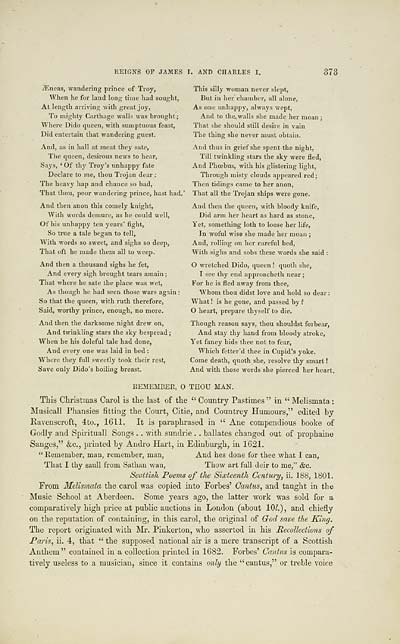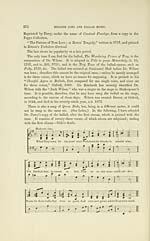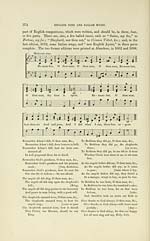Glen Collection of printed music > Printed text > Popular music of the olden time > Volume 1
(407) Page 373 - Remember, o thou man
Download files
Complete book:
Individual page:
Thumbnail gallery: Grid view | List view

REIGNS OF JAMES I. AND CHARLES I.
373
tineas, wandering prince of Troy,
When he for land long time had sought,
At length arriving with great joy,
To mighty Carthage walls was brought;
Where Dido queen, with sumptuous feast,
Did entertain that wandering guest.
And, as in hall at meat they sate,
The queen, desirous news to hear.
Says, ' Of thy Troy's unhappy fate
Declare to me, thou Trojan dear ;
The heavy hap and chance so bad.
That thou, poor wandering prince, hast had.'
And then anon this comely knight,
With words demure, as he could well.
Of his unhappy ten years' fight.
So true a tale began to tell.
With words so sweet, and sighs so deep,
That oft he made them all to weep.
And then a thousand sighs he fet.
And every sigh brought tears amain ;
That where he sate the place was wet.
As though he had seen those wars again :
So that the queen, with ruth therefore.
Said, worthy prince, enough, no more.
And then the darksome night drew on.
And twinkling stars the sky bespread ;
When he his doleful tale had done,
And every one was laid in bed :
Where they full sweetly took their rest,
Save only Dido's boiling breast.
This silly woman never slept,
B\it in her chamber, all alone,
As one unhajjpy, always wept.
And to the walls she made her moan ;
That she should still desire in vain
The thing she never must obtain.
And thus in grief she spent the night.
Till twinkling stars the sky were fled.
And Phosbus, with his glistering light,
Through misty clouds appeared red ;
Then tidings came to her anon.
That all the Trojan ships were gone.
And then the queen, with bloody knife.
Did arm her heart as hard as stone,
Yet, something loth to loose her life,
In woful wise she made her moan ;
And, rolling on her careful bed,
With sighs and sobs these words she said :
O wretched Dido, queen ! quoth she,
I see thy end approachetb near ;
For he is fled away from thee.
Whom thou didst love and hold so dear :
What ! is he gone, and passed by '.'
O heart, prepare thyself to die.
Though reason says, thou shouldst forbear.
And stay thy hand from bloody stroke.
Yet fancy bids thee not to fear.
Which fetter'd thee in Cupid's yoke.
Come death, quoth she, resolve thy smart!
And with those words she pierced her heart.
REMEMBER, THOU MAN.
This Christmas Carol is the last of the "Country Pastimes" in "Melismata:
Musicall Phansies fitting the Court, Citie, and Countrey Humours," edited by
Ravenscroft, 4to., 1611. It is paraphrased in " Ane compendious booke of
Godly and SpLrituall Songs . . with sundi-ie . . ballates changed out of prophaine
Sanges," &c., printed by Andro Hart, in Ediubm-gh, in 1621.
" Remember, man, remember, man. And hes done for thee what I can,
That I thy sauU from Sathan wan, Thow art full deir to me," &c.
Scottish Poems of tlie Sixteentli Century, ii. 188, 1801.
From Melismata the carol was copied into Forbes' Cantus, and taught in the
Music School at Aberdeen. Some years ago, the latter work was sold for a
comparatively high price at public auctions in London (about 10/.), and chiefly
on the reputation of containing, in this carol, the original of God save the King.
The report originated with Mr. Pinkerton, who asserted in his Recollections of
Paris, ii. 4, that " the supposed national air is a mere transcript of a Scottish
Anthem " contained in a collection printed in 1682. Forbes' Cantus is compara-
tively useless to a musician, since it contains only the "cantus," or treble voice
373
tineas, wandering prince of Troy,
When he for land long time had sought,
At length arriving with great joy,
To mighty Carthage walls was brought;
Where Dido queen, with sumptuous feast,
Did entertain that wandering guest.
And, as in hall at meat they sate,
The queen, desirous news to hear.
Says, ' Of thy Troy's unhappy fate
Declare to me, thou Trojan dear ;
The heavy hap and chance so bad.
That thou, poor wandering prince, hast had.'
And then anon this comely knight,
With words demure, as he could well.
Of his unhappy ten years' fight.
So true a tale began to tell.
With words so sweet, and sighs so deep,
That oft he made them all to weep.
And then a thousand sighs he fet.
And every sigh brought tears amain ;
That where he sate the place was wet.
As though he had seen those wars again :
So that the queen, with ruth therefore.
Said, worthy prince, enough, no more.
And then the darksome night drew on.
And twinkling stars the sky bespread ;
When he his doleful tale had done,
And every one was laid in bed :
Where they full sweetly took their rest,
Save only Dido's boiling breast.
This silly woman never slept,
B\it in her chamber, all alone,
As one unhajjpy, always wept.
And to the walls she made her moan ;
That she should still desire in vain
The thing she never must obtain.
And thus in grief she spent the night.
Till twinkling stars the sky were fled.
And Phosbus, with his glistering light,
Through misty clouds appeared red ;
Then tidings came to her anon.
That all the Trojan ships were gone.
And then the queen, with bloody knife.
Did arm her heart as hard as stone,
Yet, something loth to loose her life,
In woful wise she made her moan ;
And, rolling on her careful bed,
With sighs and sobs these words she said :
O wretched Dido, queen ! quoth she,
I see thy end approachetb near ;
For he is fled away from thee.
Whom thou didst love and hold so dear :
What ! is he gone, and passed by '.'
O heart, prepare thyself to die.
Though reason says, thou shouldst forbear.
And stay thy hand from bloody stroke.
Yet fancy bids thee not to fear.
Which fetter'd thee in Cupid's yoke.
Come death, quoth she, resolve thy smart!
And with those words she pierced her heart.
REMEMBER, THOU MAN.
This Christmas Carol is the last of the "Country Pastimes" in "Melismata:
Musicall Phansies fitting the Court, Citie, and Countrey Humours," edited by
Ravenscroft, 4to., 1611. It is paraphrased in " Ane compendious booke of
Godly and SpLrituall Songs . . with sundi-ie . . ballates changed out of prophaine
Sanges," &c., printed by Andro Hart, in Ediubm-gh, in 1621.
" Remember, man, remember, man. And hes done for thee what I can,
That I thy sauU from Sathan wan, Thow art full deir to me," &c.
Scottish Poems of tlie Sixteentli Century, ii. 188, 1801.
From Melismata the carol was copied into Forbes' Cantus, and taught in the
Music School at Aberdeen. Some years ago, the latter work was sold for a
comparatively high price at public auctions in London (about 10/.), and chiefly
on the reputation of containing, in this carol, the original of God save the King.
The report originated with Mr. Pinkerton, who asserted in his Recollections of
Paris, ii. 4, that " the supposed national air is a mere transcript of a Scottish
Anthem " contained in a collection printed in 1682. Forbes' Cantus is compara-
tively useless to a musician, since it contains only the "cantus," or treble voice
Set display mode to: Large image | Transcription
Images and transcriptions on this page, including medium image downloads, may be used under the Creative Commons Attribution 4.0 International Licence unless otherwise stated. ![]()
| Special collections of printed music > Glen Collection of printed music > Printed text > Popular music of the olden time > Volume 1 > (407) Page 373 - Remember, o thou man |
|---|
| Permanent URL | https://digital.nls.uk/91372331 |
|---|
| Shelfmark | Glen.254 |
|---|---|
| Additional NLS resources: | |
| Attribution and copyright: |
|
| Description | Scottish songs and music of the 18th and early 19th centuries, including music for the Highland bagpipe. These are selected items from the collection of John Glen (1833 to 1904). Also includes a few manuscripts, some treatises, and other books on the subject. |
|---|
| Description | The Glen Collection and the Inglis Collection represent mainly 18th and 19th century Scottish music, including Scottish songs. The collections of Berlioz and Verdi collected by bibliographer Cecil Hopkinson contain contemporary and later editions of the works of the two composers Berlioz and Verdi. |
|---|

